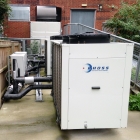Klima-Therm delivers efficient cooling for computer server room

Klima-Therm has delivered a high-efficiency cooing solution for a computer server room at Salisbury District Hospital that uses fresh air to augment mechanical cooling. The system replaced two traditional CRAC (computer-room air-conditioning) units originally designed for indoor application but installed outdoors and partially weatherproofed.
The old system had simple on-off operation, regardless of the load or ambient conditions
The new system comprises two vertical AHUs with EC fans, chilled-water cooling coils and a fresh-air mixing box. The AHUs are served by Rhoss chillers with variable-speed scroll compressors.
The chiller-AHU combination has a cooling capacity of 46.5 kW, which is supported by fresh-air cooling when ambient temperatures permit.
An intelligent control system enables up to 15% fresh air to be introduced into the AHU airstream. The variable-speed compressors also contribute to significant energy savings — estimated at up to 30%.
Jerry Henderson, estates project office at the hospital, said, ‘The key is not only to reduce energy consumption but deliver this while maintaining and/or improving reliability, resilience and sustainability.’
The success of the project has led to further work for Klima-Therm at the hospital, including an HVAC solution for a new breast-care clinic.







